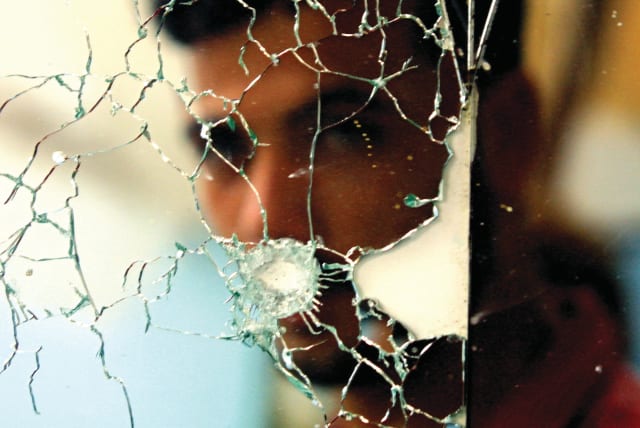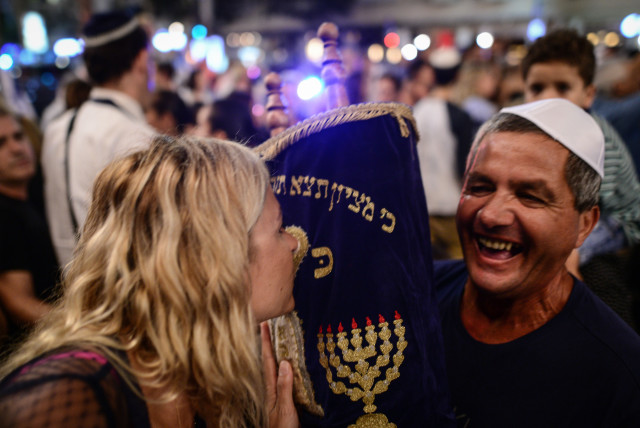Heaven will help us for peace, but only after helping ourselves first - comment

It is the spirit of Sukkot and Simchat Torah that will somehow bring us together rather than the specter of war or some other external crisis.
Certainly one of the most unusual holidays on the Jewish calendar is Shmini Atzeret/Simchat Torah, celebrated this weekend as one day in Israel and two separate days in the Diaspora. Is this chag a part of Sukkot, we might ask, or apart from Sukkot? The answer, in typically Jewish fashion, is yes!
On the one hand, Shmini Atzeret is clearly connected to Sukkot. It is literally called the “eighth day,” and so it automatically defines itself in relation to and in conjunction with the seven days of Sukkot. It also is characterized in the liturgy as Z’man Simchatenu, the time of our rejoicing, which is the precise phrase used for Sukkot. Yet, on the other hand, we no longer sit in our sukkot on Shmini Atzeret, nor do we take the arba minim, –the lulav (palm branch), etrog (citron), hadassim (myrtle), and aravot (willow) – that we blessed during the past week.
The rabbis, puzzled by this dichotomy, offer a famous parable. It tells of the king who held a week-long celebration with his subjects, at which they dined and drank together and closely bonded with one another. When the week was over, the king was so overjoyed by the event and so reluctant to see it come to an end that he pleaded with his guests to stay just one more day. “Kasheh alai preidatchem” (your separation is hard for me), he lamented.
There is a deep message here, one that is so perfectly suited for our times.
All week long, the Jewish people have bonded together. We moved out of our homes and squeezed into tiny sukkot. For seven days, all of us, rich or poor, more or less had habitations of equal value. We took the Four Species, which by tradition represent different types of Jews – those who are learned, those who do acts of kindness, the celebrated, and the simple – and we tied them together into one tight bundle. On Hol Hamoed, we (in Israel) repeated the exact same Torah reading four times so no one could claim they received a “better” aliyah. And on Simchat Torah, not only do we widely dispense honors to one and all, but we dance around the Torah in a circle so that each and every person should be equidistant in connection to the center.
God, as it were, takes note of this extraordinary sense of camaraderie among the nation. God is jubilant but, at the same time, sad. “Kasheh alai preidatchem,” says God. “All week long – plus a day – you have exhibited a wonderful sense of togetherness that filled Me with joy. But now you will depart and go your separate ways; you will leave that ‘circle of oneness,’ and you will no longer be united. And that is hard on Me; that makes Me terribly sad.”
THE FRAGMENTATION in Jewish society – both here and abroad – is alarming in the extreme. Whether it is an assault on Jews who are at prayer, or the ugly rhetoric of a Knesset so-called rabbi blaming Zionists for causing all of our problems – including the Shoah – it is the voice of disunity, the voice of disdain for the other, the voice of dismissal of our calling as a holy nation and light unto the world. And God surely is not happy.
As with most predicaments, we are experts at identifying the problem but hard-pressed to suggest a solution. The fear among many is that we may have passed the point of no return, and now that the evil genie has been let out of the bottle, we cannot put it back in. Hope is in short supply.
I believe that we must approach this crisis from two directions, from both the top and the bottom. The people we elected as leaders must take urgent action to heal the wounds, to stop focusing on their own power and privilege, and humbly consider the needs of the nation, above all else. You were duly elected, you claim? Maybe, but that doesn’t amount to much if you are presiding over a country in chaos. You’re right and they’re wrong; you stand for democracy and justice, you claim? Perhaps, but you’re just echoing their same exact mantra. Get over yourselves and show leadership.
At the same time, the average citizen must also stop proclaiming his being right and come out of his cage of concrete conclusions to greet the other side and allow for their point of view as well. Perhaps, most importantly, we need to identify and unite behind those special people who can indeed lead the way back to civility.
Before our teary eyes
This week marks the 21st anniversary of the death of our eldest son, Ari. He fell in battle in 2002 against Hamas terrorists in Nablus, just two days after Simchat Torah. He was 21 when he was killed, so I can truly say that a whole lifetime without him has passed before our teary eyes.
Ari was exactly the type of “crossover” personality that we are in desperate need of. He had innumerable friends from all walks of life, both secular and religious. He studied Torah in a pre-army yeshiva in Safed, and he loved the nightlife in Tel Aviv as well. He urged his fellow soldiers to fast on Yom Kippur, and he routinely gave up his leave on Shabbat so that other boys could go home. He carried a Machzor in one pocket and a bit of food in the other when he went on missions over the chag. He believed in the ideal of a multidimensional, united Israel that upheld Jewish values while living life to the fullest.
God and Ari, I believe, are looking down at Israel and expecting that we will right this worrying situation, one that is hard on them, as well as on us. Hopefully, it is the spirit of Sukkot and Simchat Torah that will somehow bring us together rather than the specter of war or some other external crisis. No doubt heaven will help us in our quest for peace, but only after we help ourselves first.
Chag sameach – a happy and united holiday.
The writer is director of the Jewish Outreach Center of Ra’anana. Write to him at
jocmtv@netvision.net.il
Jerusalem Post Store
`; document.getElementById("linkPremium").innerHTML = cont; var divWithLink = document.getElementById("premium-link"); if (divWithLink !== null && divWithLink !== 'undefined') { divWithLink.style.border = "solid 1px #cb0f3e"; divWithLink.style.textAlign = "center"; divWithLink.style.marginBottom = "15px"; divWithLink.style.marginTop = "15px"; divWithLink.style.width = "100%"; divWithLink.style.backgroundColor = "#122952"; divWithLink.style.color = "#ffffff"; divWithLink.style.lineHeight = "1.5"; } } (function (v, i) { });

